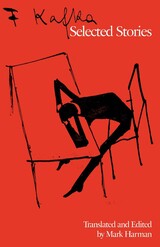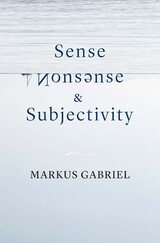5 books by Longino, Helen
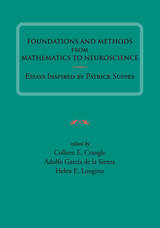
Foundations and Methods from Mathematics to Neuroscience
Essays Inspired by Patrick Suppes
Edited by Colleen E Crangle, Adolfo García de la Sienra, and Helen E. Longino
CSLI, 2014
During his long and continuing scholarly career, Patrick Suppes has contributed significantly both to the sciences and to scientific philosophies. In this volume, an international group of Suppes’s colleagues, collaborators, and students seeks to build upon Suppes’s insights. Each of their essays is accompanied by a response from Suppes himself, which together create a uniquely engaging dialogue. Suppes and his peers explore a diverse array of topics including the relationship between science and philosophy; the philosophy of physics; problems in the foundations of mathematics; theory of measurement, decision theory, and probability; the foundations of economics and political theory; psychology, language, and the philosophy of language; Suppes’s most recent research in neurobiology; and the alignment (or misalignment) of method and policy.
[more]

Gender and Scientific Authority
Edited by Barbara Laslett, Sally Gregory Kohlstedt, Helen Longino, and Evelynn Hammonds
University of Chicago Press, 1996
This volume of recent Signs articles offers some of the most significant contributions to the debates on history and theory. Illustrating the uses of theories in recent feminist historical research and the often contentious arguments that surround them, the articles speak to a number of discussions, including the theoretical tradition of political economy, the importance of class relations for understanding historical events and social relationships, and the expansion of concepts from political economy to include race. Included as well are the workings of gender signification in terms of the body, moving it from its traditionally lesser position in the hierarchical Enlightenment mind/body split. A further group of articles concerns the discursive character of power relations and the dialogic quality of language. The volume will be extremely useful for feminist historians in a variety of disciplines as well as women's studies students interested in issues of interdisciplinarity.
[more]

Osiris, Volume 12
Women, Gender, and Science: New Directions
Edited by Sally Gregory Kohlstedt and Helen Longino
University of Chicago Press, 1997
What do research on women in science and research on science and gender have to do with each other? This volume brings together prominent historians and philosophers of science to examine women's participation in science, gender and science, and the potential for interaction between these two pieces of a larger puzzle. The eleven chapters included here explore a number of interrelated topics: the experiences of individual women working in science; the demographic patterns of and support for women in specific fields; the gendered construction of scientific education and terminology; the impact of feminist critiques on contemporary science; and more. The result is a collection of works that are rich in suggestions, specific in their evidence, and grounded in the complex discussion of gender in late twentieth century cultural and academic life.
[more]
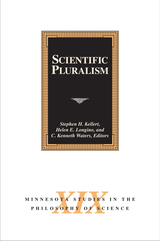
Scientific Pluralism
Stephen H. Kellert
University of Minnesota Press, 2006
Scientific pluralism is an issue at the forefront of philosophy of science. This landmark work addresses the question, Can pluralism be advanced as a general, philosophical interpretation of science? Scientific Pluralism demonstrates the viability of the view that some phenomena require multiple accounts. Pluralists observe that scientists present various—sometimes even incompatible—models of the world and argue that this is due to the complexity of the world and representational limitations. Including investigations in biology, physics, economics, psychology, and mathematics, this work provides an empirical basis for a consistent stance on pluralism and makes the case that it should change the ways that philosophers, historians, and social scientists analyze scientific knowledge.Contributors: John Bell, U of Western Ontario; Michael Dickson, U of South Carolina; Carla Fehr, Iowa State U; Ronald N. Giere, U of Minnesota; Geoffrey Hellman, U of Minnesota; Alan Richardson, U of British Columbia; C. Wade Savage, U of Minnesota; Esther-Mirjam Sent, U of Nijmegen.Stephen H. Kellert is professor of philosophy at Hamline University and a fellow of the Minnesota Center for Philosophy of Science. Helen E. Longino is professor of philosophy at Stanford University. C. Kenneth Waters is associate professor of philosophy and director of the Minnesota Center for Philosophy of Science.
[more]
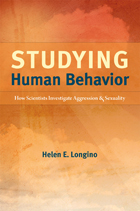
Studying Human Behavior
How Scientists Investigate Aggression and Sexuality
Helen E. Longino
University of Chicago Press, 2013
In Studying Human Behavior, Helen E. Longino enters into the complexities of human behavioral research, a domain still dominated by the age-old debate of “nature versus nurture.” Rather than supporting one side or another or attempting to replace that dichotomy with a different framework for understanding behavior, Longino focuses on how scientists study it, specifically sexual behavior and aggression, and asks what can be known about human behavior through empirical investigation.
She dissects five approaches to the study of behavior—quantitative behavioral genetics, molecular behavior genetics, developmental psychology, neurophysiology and anatomy, and social/environmental methods—highlighting the underlying assumptions of these disciplines, as well as the different questions and mechanisms each addresses. She also analyzes efforts to integrate different approaches. Longino concludes that there is no single “correct” approach but that each contributes to our overall understanding of human behavior. In addition, Longino reflects on the reception and transmission of this behavioral research in scientific, social, clinical, and political spheres. A highly significant and innovative study that bears on crucial scientific questions, Studying Human Behavior will be essential reading not only for scientists and philosophers but also for science journalists and anyone interested in the engrossing challenges of understanding human behavior.
[more]
READERS
Browse our collection.
PUBLISHERS
See BiblioVault's publisher services.
STUDENT SERVICES
Files for college accessibility offices.
UChicago Accessibility Resources
home | accessibility | search | about | contact us
BiblioVault ® 2001 - 2024
The University of Chicago Press



